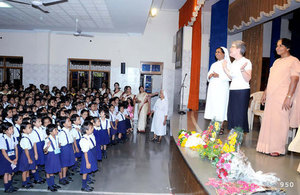Holy See: International Women's Day profiles. Sr Jane Livesey
Empowering Women and Girls through Education in advance of International Women´s Day.

Sr. Jane Livesey addresses one of the Congregation's schools in Northern India.
Sister Jane Livesey, the British Superior-General of the Congregation of Jesus, leads an organisation of 1,700 sisters working throughout the world - in Europe, Africa, South America, Asia and particularly in India - empowering women and girls through education.
Sister Jane felt called to join the Congregation while she was studying law and, after a degree at Cambridge and a period teaching, spent 13 years as headmistress of a school in Dorset before rising to be English Provincial and then Superior-General.
When we talk on the phone, Jane tells me a little about the Congregation’s remarkable founder. Mary Ward, an Englishwoman born to a Catholic family in Yorkshire in 1585 (at a time when being a Catholic was seen as treasonous), heard words telling her to ‘take the name of the Society’ (i.e. the Society of Jesus, the Jesuits). At the time women religious were required to remain cloistered, but Mary decided that her sisters would go out into the world. She founded schools for girls all over Europe. Her vision was of a worldwide order, so she did not put her sisters under a Superior-General, but the local bishop. Mary was a pioneer: both non-enclosure, and establishment outside the diocesan hierarchy were to become common features of the many new orders founded in the nineteenth century.
Mary Ward faced serious opposition from within the Church in her lifetime. First dismissed as the ‘galloping girls’, in 1631 Pope Urban VIII suppressed the order and ordered Mary’s arrest. Two small houses kept her vision alive, and in the nineteenth and twentieth centuries she was rehabilitated. In 2009 the Church recognised her as ‘venerable’. Her supporters are now making the case for beatification.
Mary had a very clear sense of the contribution women could make. To the dismissive words ‘They are but women’ she said ‘There is no such difference between men and women that women may not do great things…In time to come it may be seen that women can do much.’ She saw the religious vocation as one for strong women. ‘This is not a time for half women’ she said. ‘We are in want of good ones.’
Jane Livesey, Mary’s modern successor, is taking forward the order’s charism (guiding idea) of freedom, justice and authenticity. Jane and her predecessors have overseen a move away from running schools in Europe, and towards helping women where they are in most need now - as victims of trafficking and modern slavery, in hospitals and in prisons. In India and Latin America the order still runs schools, seeing that as the best route to improving women’s lives.
Jane, like the founder, believes the religious life was a choice for the strongest women in the 1960s and earlier. It opened up more options than the traditional occupations for educated women of teacher, nurse or wife and mother. Jane is not pessimistic about the decline of vocations, seeing that as a natural consequence of the changing role of women. But she believes the religious orders will not die out, and there will always be some who will choose this radical way of giving themselves to God.
I hope so. The work of the ‘Jesuitesses’ is very valuable.
Sally Axworthy British Ambassador to the Holy See
Follow @SallyAxworthy